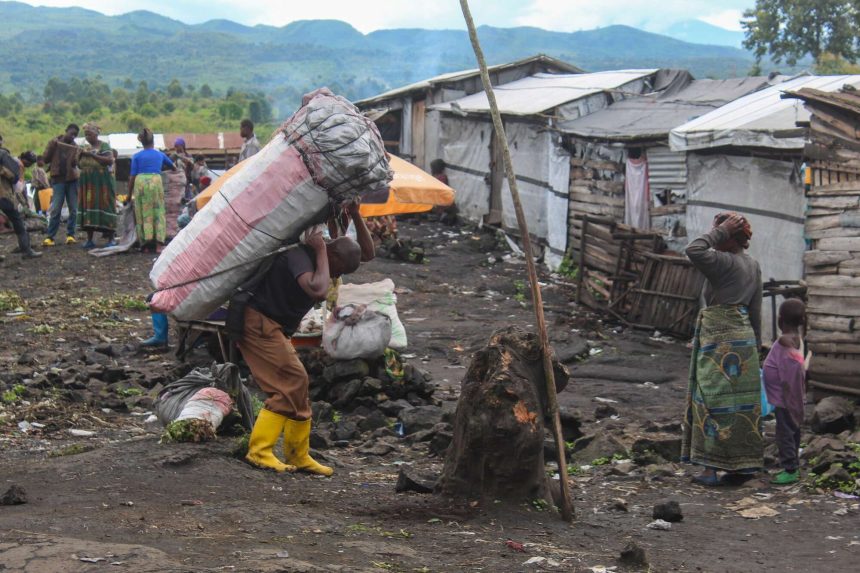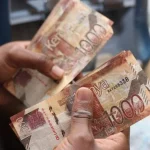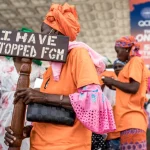If Kahambu Vwiravwameso, a farmer, stands on the hills on the eastern side of Kamandi, a village in southern Lubero, she can see some of Virunga National Park. The park, which runs through a densely populated area on the western shores of Lake Edward, in eastern Democratic Republic of Congo, is a breath-taking expanse of green land with rich biodiversity.
Over four million people live within a day’s walk from Virunga National Park, home to 500,000 hectares (1.2 million acres) of extremely fertile land, according to a 2018 paper published in the Journal of Peasant Studies. The ballooning of the rural population in North Kivu province — which has grown almost sixfold since 1960 — has made the fertile lands in Virunga National Park a coveted resource.
Some local small-scale farmers grow food within the park to sustain their livelihoods. Vwiravwameso is one of them. She used to farm on three hectares (seven acres) in an area of Ndwali called Marestaurant, which she says shouldn’t belong to the park.
Like other farmers from neighbouring villages, Vwiravwameso would camp there in a temporary shelter until what she’d planted was ready for harvest.
“Every Saturday, my children would join me in the field where I camped to gather food. Life was good. There was plenty of food. I made a lot of money because I harvested more than 10 bags of beans per season,” the 39-year-old farmer says.
Then, in September 2021, park rangers from the Congolese Institute for Nature Conservation (ICCN), the state agency responsible for overseeing DRC’s national parks, found her working in her field, just when her crops were in the nascent stages.
“They chased me and the other people, scattering us with bullets,” she says.
Vwiravwameso had to abandon everything; all the beans, maize and cassava she had planted, even the chickens she had reared. She joined the rest of her family in Kamandi. Feeding them became a challenge, as she depended on the harvest from the farm to feed her eight children. During the raid, the ICCN set fire to homes and crops.
In that same month, according to an ICCN report, they reclaimed Ndwali from some of the many armed groups that live and operate in Virunga National Park.
Two months later, a ranger outpost replaced Vwiravwameso’s former village, as seen in satellite imagery. The outpost, according to a written response to Global Press Journal from Olivier Mukisya, Virunga National Park spokesperson, is “to enable the Rangers to re-establish their presence in this part of the park and regain control of an area of the park, as required by law, that was previously under the control of armed groups.”
Like Vwiravwameso, many in Kamandi and neighbouring villages have faced recurring evictions from Virunga National Park by ICCN rangers, a situation they say has denied them access to their ancestral land, affected food production in the region, and been a catalyst for numerous human rights abuses.
Their plea to the ICCN is twofold: allow them to farm on their ancestral land and address the ICCN rangers’ alleged human rights abuses.
Rangers, however, claim that locals have been carrying out illegal activities such as farming on land that is protected and was declared a Unesco World Heritage Site in 1979.
Jean-Pierre Kasereka Sivamwenda, a nutritionist at the Kamandi Health Centre, says there is evidence that some families in Kamandi are struggling to put food on the table, which could be a result of recurring evictions.
“We have recorded 183 children suffering from malnutrition from January 2022 to March 2023, of which 30 cases are severe. This is because the food consumed here comes from areas where people were displaced,” Sivamwenda says.
Locals claim that the ICCN, in its efforts to protect the park, has committed numerous human rights abuses. Paluku Sivihwa, a farmer who was displaced and now lives in Kamandi, says the evictions have cost them more than farming fields.
“They [the ICCN] have taken many lives, raped, burned houses, schools, health facilities, arrested people, and injured others. The education of many children has been ruined because their parents can no longer afford it,” he says.
Kambale Machokuona Déogratias, a farmer who now lives in Kamandi, agrees. He says the violence inflicted by the ICCN on local people is extreme. It has included beatings, injuries, even murders, says the 61-year-old father of 12, who was displaced from Ndwali, an area the ICCN claims belongs to the park.
Some of these violations have been well documented. For example, in 2013, judicial authorities and representatives of the United Nations Organisation Stabilisation Mission in the Democratic Republic of the Congo (Monusco), a peacekeeping mission, led an investigation in Kamandi and found, among other abuses, “63 cases of rape, at least four summary executions and other cases of ill-treatment or torture, forced labour, arbitrary detention, illegal detention and destruction of property.” Soldiers and ICCN rangers were allegedly responsible for these human rights violations between December 2010 and January 2011 in the town of Ndwali and carried them out during evictions from land that authorities believe belongs to the park.
Kahindo Maluku was left permanently scarred by the evictions. The 42-year-old recalls the pain she endured in 2018, when ICCN rangers chased her from a piece of land she used to farm.
The evictions took place over a period of two days. On the first day, her neighbours fled, but she hid under tall grass and managed to avoid the rangers who had deployed a drone to find those farming in the park. When they came back the next day, they had guns. She didn’t know when they started firing. She only felt it.
“One in the thigh and the other in the [lower] leg. I fainted and regained consciousness when I was already at the general hospital in Kayna,” she says.
Although the International Committee of the Red Cross took her to Switzerland for treatment, where she stayed for six months before returning to Kamandi, the incident left her disabled.
Bienvenu Bwende, the ICCN’s communications officer, insists that the park is a protected area.
“Human activities, such as agriculture, hunting, exploitation of trees, are prohibited in the park. That’s why we chase people out of there. This park is a World Heritage Site that must be well protected,” he says.
Despite several requests for comment, Bwende did not respond to accusations that ICCN rangers have committed human rights abuses in their efforts to protect the park.
By email, Mukisya says the agency is legally responsible for re-establishing “the rule of law, not only to protect the Park’s wildlife, but also to overcome the presence of armed groups in and around Virunga National Park, with the aim of restoring peace and stability to the region.”
Virunga National Park is entwined with the conflict in the region, Mukisya says. “The trafficking of natural resources by armed militias is widely recognized as a cause of extreme violence and insecurity. The Virunga National Park is particularly important in this respect, due to the exceptional value of its natural resources.”
Militia leaders “and their powerful and often very wealthy clients” benefit from illegal resource extraction from the park, Mukisya says, and they do so by exploiting local communities who undertake agricultural activities within the park, which is prohibited by law.
“This is the case of the widespread illegal acquisition of land for agricultural purposes in the park,” he says, particularly in the areas Global Press Journal has referenced in this article. But Mukisya says the ICCN recognizes the sensitivity of this issue, and for this reason, their rangers have guidelines on how to handle these situations with utmost sensitivity. In most cases, they release those intercepted without charge. They take repeat offenders to court while making sure to “monitor the chain of custody very closely to ensure that detainees’ rights are protected.”
Mukisya admits that sometimes, “to regain control of areas previously controlled by armed groups, ranger interventions can lead to direct clashes with armed groups and tensions with the communities who exploit the resources in these areas.”
In such situations, even rangers become targets of armed violence, he says. More than 200 rangers have lost their lives to militia attacks since the war started in 1996. While field operations “are guided by the principles set out in international human rights law,” he says, that “does not preclude the use of force in self-defence or to protect colleagues or other civilians.”
He adds that the ICCN closely monitors ranger activities and has found “no record of any serious incidents,” including those that Global Press Journal has referenced. However, he says it “does not mean that no individuals were arrested or escorted out of the Park during this period, which is common, but that no shots were fired by rangers during these operations.”
But “law enforcement alone cannot solve these deep-rooted problems,” Mukisya says. “We recognize that at present, tensions remain high due to the protected status of Virunga National Park, which excludes a number of economic activities, such as farming in the national park. Strengthening community relations and active dialogue with local communities are key to easing some of these tensions.”
Meanwhile, a few locals have stood their ground and continue hiding in the park to protect their livelihoods.
Resto Kambale Matina, president of the Civil Society of Vuhoyo, a non-profit, says that many of them are aware of the risks. “They go into hiding when they feel the presence of the park rangers in the area. But they know it is dangerous if they are caught. They work [in the fields] at night and hide during the day.”
All of this is for lack of alternative sources of food and income, Matina says. “We have been chased out of our fields; we no longer have any good land to cultivate. There are only trees and dry land.”
Frustrated by repeated evictions, other locals have deployed violent measures. Alphonse Muhindo Kivuno, a 73-year-old resident of Kamandi who compares the ICCN to the armed groups M23 and Allied Democratic Forces, says that some farmers, especially younger people who are frustrated by the ICCN’s cruelty, have armed themselves to defend what they believe is their right.
“This ruthless institution has made our lives bitter by chasing us from our fields. All this has created a spirit of revenge in our hearts,” he says. “There will never be peace between us and the ICCN.”
Kaniki Salomon, a local from Kamandi and human rights defender with International Circle for the Defence of Human Rights, Peace, and the Environment, a local non-profit, confirms that some have decided to fight the ICCN to defend what they believe is their ancestral land, a situation that has worsened security.
He adds that no part of Lubero’s territory belongs to Virunga National Park.
“The government must resolve this problem that has gone on for too long. There is no park in the territory of Lubero,” he says. “We have marched and petitioned, but we have not been able to get any results. What we want is to return to our fields.”
Emmanuel Muhumburwa, chief of Kamandi village, says the ICCN commits serious human rights violations by evicting people from their ancestral land, which it refers to as park. The land, he says, belongs to locals.
Claude Visika, who was evicted in 2021, has tried farming in a small garden in Kamandi, where he currently lives. But the harvest is barely enough.
“My grandfather says he was born in this area. This is not the park. In 2004, people lived there,” he says. “In half an acre, my field produced five sacks of beans. But today, my family is starving.”
The father of five says he thinks often of the “very productive” field he left behind, which he can still see from his house in Kamandi.
“We live by the grace of God,” he says. “We are already like displaced persons. The ICCN burned our crops and destroyed our plants with herbicides. They are inhuman and ruthless. I wonder if they don’t eat.”



